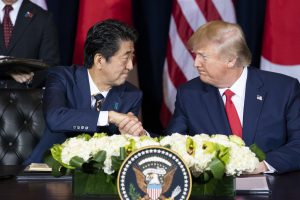In the House of Representatives election held on October 27, the ruling Liberal Democratic Party (LDP) and its coalition partner, Komeito, suffered a major defeat. As a result, the LDP government that has continued since the Abe administration took office in late 2012 is wavering. Under these circumstances, media outlets in various countries have expressed concerns about the future of Japan’s foreign and security policies.
In reality, there is little possibility of a major change in the basic line of Japan’s foreign and security policies. That said, differences in the positions of each party can be seen in specific areas.
The fact that the ruling coalition lost over 70 seats in the election means that a change of government is expected, but this will not be easy. After the House of Representatives election, the LDP has lost a large number of seats but still remains the largest party. Meanwhile, the various opposition parties – including the Constitutional Democratic Party (CDP), Nippon Ishin no Kai, and the Democratic Party for the People – do not have a unified policy, and it will be difficult for them to cooperate in the nomination of a prime minister.
Article 54 of the Japanese Constitution states that, after the election of the House of Representatives, a special Diet session must be convened within 30 days to elect the prime minister. Normally, this session would be convened around 10 days after the date of the vote. However, because the major parties need time to work out their strategy, it is expected that the special Diet session will come later than the initially scheduled date of November 7.
Until the special Diet session is called, the LDP, the largest party with 191 seats, and the CDP, which became the second largest party in 148 seats, will probably be working on securing the 233 members required to form a majority in Japan’s lower house. As a result, it is still unclear who will become the prime minister and what form the coalition government will take.
Even so, there is little chance of any major changes to foreign and security policy. For many years, Japan has maintained the Japan-U.S. alliance, which has continued to be the basis of Japan’s foreign policy. While some parties, such as the Communist Party and the Reiwa Shinsengumi, will call for major changes to this line, the majority of parties share this emphasis on the U.S. alliance. For this reason, there is little chance of this basic approach being significantly revised, whatever the make-up of Japan’s next government.
However, this does not mean that all foreign and security policies will continue unchanged. There will probably be some revisions.
Since the Abe administration, Japan has strengthened the Japan-U.S. alliance as well as its own defense system, including changing the interpretation of the constitution regarding the right to collective self-defense and enacting the Peace and Security Legislation. The Kishida administration, which succeeded the Abe administration, also followed the throughline of Abe diplomacy.
The CDP, the Democratic Party for the People, and Nippon Ishin no Kai, which are expected to have a strong influence in the incoming House of Representatives, have also announced that they will maintain the current policy of strengthening Japan’s defense capabilities and upholding the Japan-U.S. alliance.
On the other hand, each of these parties opposes following the Abe administration’s diplomacy on certain issues. In terms of maintaining the Japan-U.S. alliance, for instance, it is expected that the opposition parties will seek to reduce the burden on Japan, such as by reviewing the Japan-U.S. Status of Forces Agreement.
In addition, while all the major parties agree that Japan’s defense capabilities should be strengthened, there are many voices opposed to raising taxes as a means of doing so. The opposition parties are opposed to measures that will increase the burden on the people, such as raising taxes, so it will be difficult to push ahead with strengthening Japan’s defense capabilities without taking this into account.
The recent House of Representatives election may have been the beginning of the end for Abe diplomacy. Ironically, however, it was the LDP itself that provided the impetus for such a change. In the LDP presidential election held in September, Ishiba Shigeru became the LDP president and then Japan’s prime minister. Ishiba has been advocating policies that differ from the late Abe’s foreign policy vision, such as the creation of an Asian version of NATO and a review of the Japan-U.S. Status of Forces Agreement. In the face of Ishiba’s arguments, it has to be said that the policies of the opposition parties are actually more in line with Abe’s approach. In that sense, the continuation of Abe diplomacy will be difficult, no matter what form the government takes in the future.
The U.S. presidential election will be held at a time when the political situation in Japan is becoming unstable. Regardless of the outcome of the U.S. election, Washington will probably continue to pursue a foreign policy that prioritizes its own national interests. In the process, there may be times when it asks Japan to bear more of the burden. It is currently unclear what kind of action Japan will take in response.
While it is unlikely that Japan will scrap the Japan-U.S. alliance or review the alliance relationship, there is a good possibility that it will review its existing policies, such as the Status of Forces Agreement and other specifics of defense cooperation.
However, it will be difficult to change the basic foundation of Japanese diplomacy, which is to maintain the Japan-U.S. alliance and strengthen defense capabilities, in the current security environment, where China poses a threat. The Japan-U.S. relationship may be troubled, but it is unlikely to break down. How to manage the Japan-U.S. alliance will be homework for the two countries once their new governments are formed and in office.
































